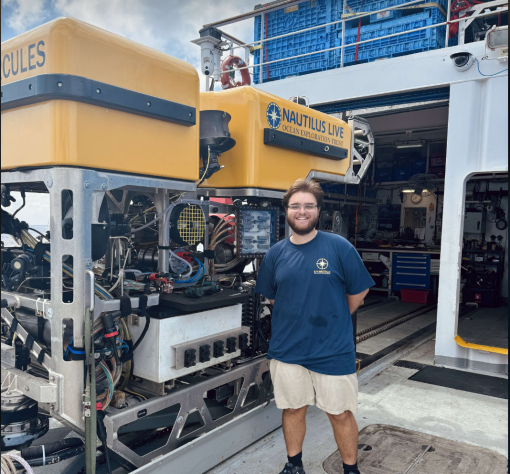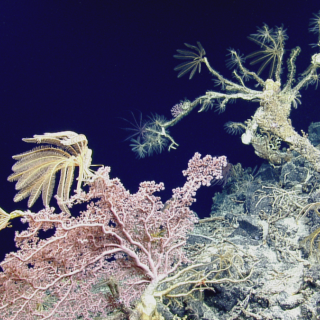Meet Ocean Explorer Esteban Jose Juan Torres

OET proudly welcomes Esteban Jose Juan Torres to the Corps of Exploration as part of the Science & Engineering Internship Program. This internship program supports community college, undergraduate, and graduate students in building professional workforce experience and exploring STEAM-related careers that connect to research themes like robotics, ocean science, education, and exploration. Esteban is joining E/V Nautilus for our NA165 expedition as an ROV engineering intern.
We sat with him to learn more about this experience at sea and the path that led him to Nautilus.
Describe your role with OET.
My current role is as ROV Engineering Intern aboard E/V Nautilus. My responsibilities include helping with maintenance, pre-dives, post-dives, and science equipment integration into the vehicles. When on a dive watch, I’m in the Atalanta Pilot seat in the control van.
Can you tell us a little about your background? What influenced you as a child?
I grew up on the west side of Puerto Rico, and that proximity to the ocean sparked my passion and curiosity. I was constantly at the beach and always very curious. My favorite word when I was a toddler was “Why?”
I would have to highlight that my family’s support has allowed me to pursue my curiosity and passion. My first fishing trip was at about a year old, the first time I had a a drill in my hands was 3 years old, my first lego set by 5 and my first project to build an RC car from scratch by 8. Ever since then, I have continued wrenching with bigger and bigger toys and have no plans on stopping anytime soon.
When you were a kid, what did you want to be when you grew up?
I always knew I wanted to be an engineer. On a 4th-grade assignment, I drew myself playing with robots on a boat. I would also take apart my toys and put them back together, albeit with a few extra screws leftover sometimes. Luckily, I got a lot better at putting stuff back together over the years.
What would you consider to be your greatest challenge entering this field?
Personally, finding opportunities in this field is probably the biggest challenge. It is a limited amount of people and organizations that coordinate and conduct this kind of exploration work. The second biggest challenge is learning how to improvise robust solutions with limited materials and time. The deep sea is a hostile environment, you have to think ahead and prepare your solution to hold up to this environment.
Do you have any advice for someone looking to follow a similar path?
Don’t be afraid to try, get out of your comfort zone, and learn as much as you can about as much as you can.
What's next for your ocean studies and career?
Finish my Master’s in Physical Oceanography and pursue a PhD in Ocean Engineering. I’m still deciding if I want to specialize in subsea or surface vehicles but I think this expedition will definitely help me make a decision.

E Mamana Ou Gataifale II - American Samoa
American Samoa is the southernmost U.S. territory, centered in the South Pacific, 2,300 miles southwest of Hawaiʻi, and 1,500 miles northeast of New Zealand. It is home to the cradle of Polynesia’s oldest culture.



